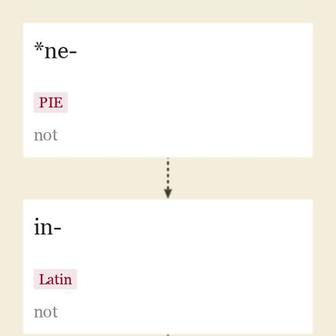incomprehension (n.)
大约1600年,来自 in-(1)“不”和 comprehension。
最早记录年份: c. 1600
incomprehension 的相关词汇
comprehension (n.)
15世纪中期,“理解的行为或事实”,源自于古法语的 comprehénsion(15世纪),直接源自拉丁语的 comprehensionem(名词格 comprehensio),意为“逮捕、抓取”,比喻意义为“知觉、理解”,是该动词的名词化处理,该动词过去分词的词干 comprehendere 意为“共同带来、囊括; 理解、知觉”(在思想上抓住或收取),由 com “与,一同”(在此可能表示完全)(参见 com-)和 prehendere “抓住,夺取”组成,其源于 prae- “在…之前”(参见 pre-)和 -hendere,源于 PIE 词根 *ghend- “抓住,取得”。1540年代作为“包含的行为”,1590年代作为“理解力”。在阅读教育中,起源于1921年。
in- (1)

这个词缀的意思是“不,相反,没有”(也可以是通过与后面的辅音音节化的 -n- 的同化而来的 im-, il-, ir-,这种趋势始于后期拉丁语),源自拉丁语 in- “不”,与希腊语 an-,古英语 un- 同源,均来自 PIE 词根 *ne- “不”。
在古法语和中古英语中,通常使用 en-,但大多数这些形式在现代英语中已经不再使用,只有极少数(例如 enemy)不再被视为否定的。在英语中的经验法则是,对于明显的拉丁语元素使用 in-,对于本土或本土化的元素使用 un-。